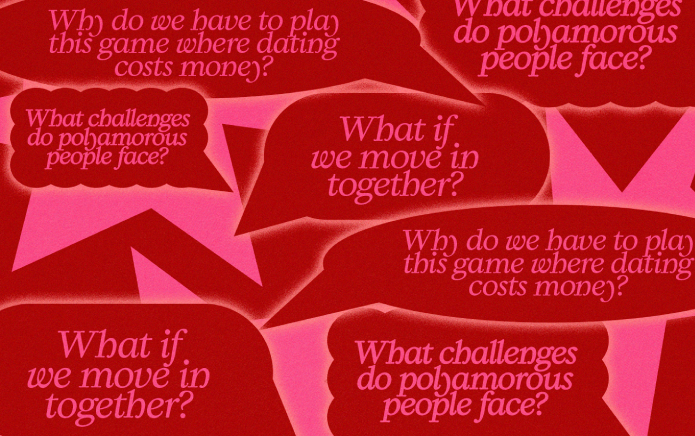Dating doesn’t have to cost the world
Dating multiple people can be more expensive – but it doesn’t have to be. “Dating has been commodified, love has become commodified,” says Millie of Decolonizing Love. “I heard a really funny joke, that Valentine’s Day is polyamory bankruptcy week. But it depends on your value system. You might be a polyamorous person who thinks, why do we have to play this game where dating costs money?”
The main thing I learnt from speaking to many polyamorous educators is that there is no one right answer. Everyone’s financial situation is different, and the activities we prioritise are different. Therefore there is no right way to date. Quality time doesn’t have to be based around spending money.
“I find a lot of people imagine that dating multiple people would be very expensive, but the reality for many polyamorous people is one, they don’t necessarily date that much more than a single monogamous person and two, dates don’t have to cost the earth,” agrees Ro Moëd, a polyamorous writer and coach. “The most meaningful dates I’ve had have been about the time we spend together and the bond we build, and this need not involve extravagant dates.”
Also, if you want to go about splitting the cost of a date, remember that fair doesn’t always mean equal. “I manage splitting costs with partners for experiences that we share by making things equitable,” adds Ro. “That means we may not pay equal shares, but pay what is fair when considering each person’s relative income and daily costs.”
What if we move in together?
If you live with one or more partners, the same principle of ‘fair does not mean equal’ might still be helpful. And the fact that everyone’s circumstances will be different remains true.
“My two partners live together full time, and I live a couple hours away. I spend about 1/3 of the month cohabitating with them,” says Annie Undone, a polyamorous writer and educator. “Because I travel so often, they don’t charge me rent. But we have a clear division of labour at the house, and I menu plan, grocery shop, and cook. We split the groceries three ways. We try to make things equitable for everyone. I highly suggest that nested polycules and partners talk about the ways that they divide expenses and time in clear and explicit ways, accounting for differences in income.”
People living with multiple partners may find themselves working with more than two incomes, which sounds great. But they will also find themselves having to accommodate the financial responsibilities of other partners. “The benefit is that there’s more people to share the load,” says Chaneé. “But the drawback is that it really just requires more communication.”
What challenges do polyamorous people face?
Most, if not all, structures in heteronormative society tend to be built for two – from all-inclusive vacations to taxes. But polyamorous people have found workarounds for these, and it’s important to put powers in place to make sure that should something happen your partners will be protected.
First, “it’s important to have a clear understanding with the people in your life,” says Chaneé. “My husband and I are legally married and my partner has lived here in the home with us for ten years. If anything were to happen to me and or him, this house would go to her. The most important person for me to have that conversation with is my next of kin and his next of kin, so our sisters are clear about our wishes.”
Once you’ve made sure the people in your life know what you would want, it’s important to think about the legality of things. “With finances, inheritance and medical issues, there are workarounds that exist but you need to speak with a professional who is licensed in these areas to figure out which of them apply to you in your specific situation,” says Laura.
But there’s another sticking point here. “What do you do if you can’t afford a lawyer?” asks Millie. There are groups across the world working to advance the rights of polyamorous people – and change, though slow, is happening. In the US, certain cities have begun recognising and enacting legal protections for those in polyamorous relationships. Polyamory UK, the Polyamory Legal Advocacy Coalition in the US and the Canadian Polyamory Advocacy Association are some of the groups campaigning for fairer rights and protection for polyamorous people, and offer resources for those navigating the legal challenges that surround polyamory.
